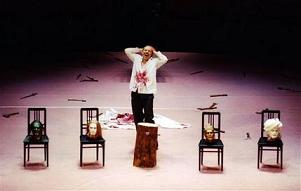 Last night, the German Opera’s production of Mozart’s “Idomeneo” went on in Berlin without incident, albeit two months late and with more than 100 green-clad cops on hand. The heavy security was deployed to protect the artistic freedom of the production’s director, Hans Neuenfels, who had added a controversial scene in which Mozart’s eponymous king lays out the severed heads of Jesus, Muhammad, Buddha, and Poseidon. Neuenfels had explained that the scene was a protest against “any form of organized religion or its founders.”
Last night, the German Opera’s production of Mozart’s “Idomeneo” went on in Berlin without incident, albeit two months late and with more than 100 green-clad cops on hand. The heavy security was deployed to protect the artistic freedom of the production’s director, Hans Neuenfels, who had added a controversial scene in which Mozart’s eponymous king lays out the severed heads of Jesus, Muhammad, Buddha, and Poseidon. Neuenfels had explained that the scene was a protest against “any form of organized religion or its founders.”
Muslims, of course, were offended by the treatment of the Prophet. Their protests, coming soon after violent protests against a cartoon depicting Muhammad in a Danish newpaper, had forced German opera authorities to cancel the revived Neuenfels production’s premiere in September. Those same authorities appeared last night, of course, to declare the triumph of artistic principles and their own intestinal fortitude.
While I’m the first to applaud anything to make opera more relevant, it’s difficult to get too fired up for Neuenfels’s defense of art. It’s one thing to deny the existence of God or gods (and Neuenfels could do that by taking The Blasphemy Challenge here), but opera and organized religion face so many common challenges–declining attendance, a failure to lure young people and the hardening of ideological positions among their remaining adherents–that for an opera maven to publicly decry organized religion smacks more of jealousy or marketing slickness than principle. After all, of the two, organized religion is getting a lot more press of late.


